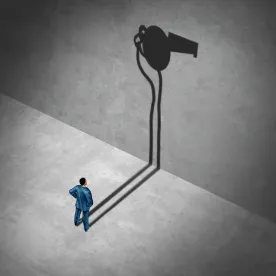As a new Congress convenes, the House of Representatives will have in place a new rule to protect the identity of whistleblowers who anonymously report wrongdoing to the House. While the new rule was announced by Speaker Nancy Pelosi in response to efforts to unmask the identity of the Intelligence Community whistleblower, whose disclosures led to the impeachment of President Trump over the Ukraine scandal, it will actually strengthen bipartisan Congressional oversight.
The new whistleblower rule will follow federal laws providing for whistleblower confidentiality and prohibit House Members from disclosing the identity of whistleblowers who fall under the protection of any federal whistleblower law. The rule would make the disclosure of a federal whistleblower’s identity a violation of the House’s Official Code of Conduct.
When House Majority Leader Steny Hoyer proposed the new whistleblower rule in November of 2020, he stated that the purpose of the rule was to promote “vigorous oversight that includes encouraging federal employees who see wrongdoing to report it anonymously and without fear of retribution.”
“Congress cannot hold the executive officials, including the president and his appointees, to account or enact laws that serve the people it represents,” Hoyer stated at the time. And without whistleblowers who are willing to report to Congress waste, fraud and abuse, the House cannot conduct effective oversight of federal agencies and the executive branch.
The new House whistleblower rule will send a strong message to federal employees throughout the government that their identities will be protected if they make protected disclosures to Congress in accordance with federal whistleblower laws, such as the whistleblower provisions of the Civil Service Reform Act and the Intelligence Community whistleblower laws. Even though the Trump-Ukraine whistleblower had a legal right to confidentiality, that did not stop some Republican Trump supporters in Congress from attempting to reveal the whistleblower’s identity. If any Member, officer or employee of the House violates the new whistleblower rule, they will be in violation of the House’s Official Code of Conduct and be subject to discipline.
Additionally, the new House whistleblower rule will also protect employees in the private sector, filing under federal laws such as the Sarbanes-Oxley Act and Dodd-Frank Act whistleblower provisions. They will be protected if they make protected disclosures to Congress about financial or corporate fraud. Thus, a corporate whistleblower will be able to anonymously report securities fraud or other Wall Street, corporate or banking scandals to Congress without fear of having their identities exposed by a Member of the House of Representatives.
Although the new House whistleblower rule is being enacted by Democrats for the term of the 117th Congress, it is not a partisan measure. Democrats are strengthening congressional oversight by protecting whistleblowers who will be coming forward to report wrongdoing and waste in the Biden administration.
For that reason alone, Republicans should embrace the new House whistleblower rule. Republicans would also be wise to support the new House whistleblower rule. In a recent Whistleblower Network News/Marist poll, 86% of likely voters said they support stronger protections for federal whistleblowers and 81% supported stronger protections for corporate whistleblowers.
The Senate should follow the House and adopt the same whistleblower rule because it is a strong policy. It is not political, it protects whistleblowers who follow the law, and it strengthens bipartisan congressional oversight.




 />i
/>i

